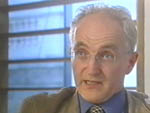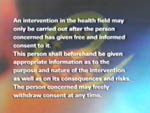 Patricia Mckenna MEP Green Party |
Mckenna: "Why are we the only country in Europe to have actually carried [fluoridation] out on such a massive scale? I mean most countries have abandoned it at this stage and in fact it's banned in some countries." | |
 |
20/20: "98% of Europe does not drink fluoridated water. Apart from 10% of the UK and 3% of Spain, virtually every European country has either stopped, rejected outright, or even banned water fluoridation as a health program. However, in the year 2001, 73% of Ireland's population drink tap water which is artificially fluoridated, and surprisingly, there are plans to further extend the program to other parts of the country in the near future." | |
 |
20/20: "The most
recent rejection of this health program [fluoridation]
has come from Northern Ireland where as recently as 1996
25 out of 26 councils voted against its introduction."
Walter Graham: "I think it was just the overriding of people's freedom of choice. Nobody has the right to drug somebody in the year 2000 against their will. Nobody has the right to do this." |
|
 Walter Graham Northern Ireland Councils Against Fluoridation |
Graham: "It's not the one glass of water that does you any harm, any more than it's the one cigarrette that causes lung cancer. It's the continuous small doses over a long period of time that create the health damage. I'm afraid that whenever we talk about proof, the only proof we're waiting for is damaged people, and I think that that's totally unacceptable." | |
 Micheal Martin Minister for Health & Children |
Martin: "The impact on the oral health has been dramatic in Ireland since that decision back in the '60s to have mandatory fluoridation of public water supplies. We shouldn't underestimate the dramatic impact on dental health in Ireland, it has really transformed the quality of teeth of Irish people." | |
 John Gormley TD Green Party |
Gormley: "This is the argument that is put forward by the Department [of Health] on every occasion - that we have seen a decrease of dental caries which was a severe problem forty years ago in this country and therefore this is linked to water fluoridation. That really doesn't stand up, because there are other countries which don't fluoridate where we've seen a huge decrease in dental caries, and we rate about 6th in Europe in terms of dental caries. Now you would expect that a country that fluoridates up to 73% of its water supplies should be up there in terms of dental health. That is not the case." | |
 |
20/20: "In the same period of time that Ireland has seen a 70% reduction of dental decay since the introduction of water fluoridation, most European countries have had an equal, if not a higher decrease in dental decay without the aid of water fluoridation." | |
 Robert Jordan 20/20 |
20/20: "What
has helped fuel the accusations that water fluoridation
is an antiquated public health program, is the fact that
it is now widely recognized in the dental establishment,
that fluoride works not by ingesting it, rather it works
in the mouth. Dr. Don Mac Auley: 'If fluoride has any effect on the teeth, then it is purely topical, that is, it acts when it makes direct contact with the tooth.'" |
|
 Dr. Gerard Gavin Chief Dental Officer Department of Health |
20/20: "If somebody
uses toothpaste twice a day do they need water
fluoridation?" Gavin: "Well that is a question, right. But our evidence is, that in this country, that our tooth brushing habits are way behind European norms and European standards. And you've also got the issue of compliance. As I say, if sometime in the future, if we can change both our eating habits and also our prevention habits in terms of how we look after our teeth, than we may not need water fluoridation in the future." |
|
 Patricia Mckenna MEP Green Party |
Mckenna: "One of the things that we're hoping is that the Convention on Human Rights and Biomedicine will have an effect here because Ireland, strangely enough, hasn't signed this convention and I'd love to know why. But under article 5 of that convention, no one is allowed to be forced to take medication which they have not agreed to and haven't given their consent. So I think under that convention, Ireland could be brought to book." | |
 |
20/20: "The 1997
Council of Europe's Convention on Human Rights and
Biomedicine, clearly states that: 'An intervention in the health field may only be carried out after the person concerned has given free and informed consent to it. This person shall beforehand be given appropriate information as to the purposes and nature of the intervention as well as on its consequences and risks. The person concerned may freely withdraw consent at any time.' |
|